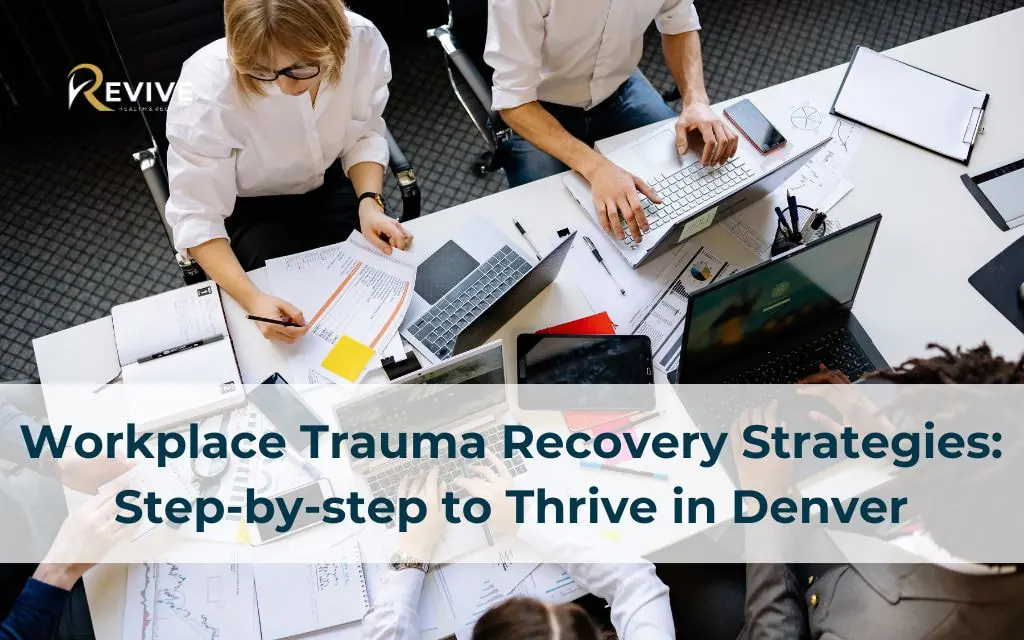The professional environment of the problem ‘Workplace Trauma Recovery Strategies’ has transformed dramatically in recent years through Healing Trauma Stories. COVID-19 brought unprecedented challenges to workplaces: sudden layoffs, extended isolation, and new forms of virtual harassment. Denver businesses have witnessed both emotional and economic consequences from these shifts.
Workplace trauma now extends beyond traditional incidents. The pandemic created novel stressors: Zoom fatigue, home-office boundary dissolution, and heightened job insecurity. These factors have contributed to a mental health crisis that requires immediate attention and strategic intervention.
At Revive Health Recovery, we recognize proactive trauma recovery strategies have become essential components of workplace wellness. Organizations that implement effective recovery protocols protect both their employees and their bottom line.
Understanding Workplace Trauma in Today’s World
What Counts as Workplace Trauma Today?
Workplace trauma encompasses a range of experiences, including various types of trauma such as: harassment (both in-person and virtual), discrimination, sudden job insecurity, remote work burnout, and exposure to distressing events, particularly for high-risk groups like first responders. The American Psychological Association’s Psychologically Healthy Workplace Program identifies these as significant contributing factors to workforce mental health challenges.
Many professionals don’t recognize their experiences as trauma, dismissing symptoms as “just stress” or “part of the job.” This lack of recognition often delays treatment and recovery.
Common Trauma Symptoms
Trauma manifests through physical, emotional, and behavioral symptoms:
- Physical: Sleep disturbances, chronic fatigue, headaches, gastrointestinal issues
- Emotional: Anxiety, dread about work, emotional numbness, irritability
- Behavioral: Workplace avoidance, substance use as coping, withdrawal from colleagues
These symptoms are recognized by the National Institute for Occupational Safety and Health as potential indicators of workplace stress and trauma.

Colorado Context
Denver’s workforce has experienced unique stressors post-2020. The combination of rapid industry growth, cost-of-living increases, and pandemic-related disruptions has created a perfect storm for workplace trauma. According to local data, mental health service requests have increased 47% since 2020, with workplace issues frequently cited as contributing factors.
The Colorado Department of Labor and Employment has recognized these challenges and provides resources for both employers and employees navigating workplace wellness issues.
Individual Recovery Strategies for Employees
Professional Therapy Options in Denver
Effective trauma treatment requires evidence-based approaches. At Revive Health Recovery, we offer multiple therapeutic modalities for workplace trauma recovery strategies:
- Cognitive Behavioral Therapy (CBT): Addresses negative thought patterns and behaviors stemming from trauma
- Eye Movement Desensitization and Reprocessing (EMDR): Processes traumatic memories through bilateral stimulation
- Somatic Therapy: Releases trauma stored in the body through physical awareness
- Brainspotting: Identifies and processes trauma through specific eye positions
The cost of workplace trauma recovery training in Denver varies based on program intensity and format. Revive Health Recovery offers flexible pricing structures to accommodate different organizational needs.
Daily Coping Tools
Between therapy sessions, individuals benefit from consistent self-care practices to support their journey of healing from trauma:
- Mindfulness meditation: Reduces rumination and anxiety (10 minutes daily provides measurable benefits)
- Journaling: Processes traumatic experiences through writing (research shows 15-20 minutes, 3-4 times weekly is optimal)
- Physical movement: Releases trauma stored in the body (walking, yoga, and strength training all provide benefits)
- Nutrition: Anti-inflammatory foods support brain health during recovery
Mental Health America recommends incorporating these practices into daily routines to build resilience against workplace stressors.
Support Groups & Peer Networks
Connection reduces isolation during recovery. Denver offers several workplace trauma-specific support resources:
- The Center for Trauma & Resilience provides peer support groups
- Resilience Counseling Co. offers virtual workplace trauma recovery sessions
- Revive Health Recovery hosts both in-person and online community support meetings
When to Seek Help
Identifying when to pursue professional help for workplace trauma recovery strategies is crucial. Signs indicating immediate intervention include:
- Intrusive thoughts about work events
- Avoidance behaviors affecting job performance
- Sleep disturbances lasting more than two weeks
- Increased substance use to manage work stress
For those seeking to find workplace trauma recovery program in Denver, Revive Health Recovery offers comprehensive assessment services to determine appropriate treatment levels.

Organizational Recovery Strategies for HR & Leaders
Creating a Trauma-Informed Culture
Organizations bear responsibility for creating environments that prevent trauma and support recovery. Dr. Cary L. Cooper, a leading workplace trauma researcher published in the Journal of Occupational Health Psychology, emphasizes that trauma-informed workplaces experience 32% less turnover and 41% fewer sick days. Implementing trauma-informed care practices can significantly enhance workplace resilience.
Key elements include:
- Trauma-aware communication protocols
- Safe feedback mechanisms
- Recognition of trauma symptoms
- Clear response procedures
Step-by-Step Framework
To implement workplace trauma recovery strategies, organizations should follow this framework:
- Assessment: Evaluate current trauma exposure and organizational response capabilities
- Planning: Develop trauma-specific policies and procedures
- Training: Equip leaders and HR with trauma response skills
- Support Systems: Create ongoing resources for affected employees
The Workplace Mental Health Institute recommends annual reassessment to maintain effectiveness.
Leadership Buy-In
Trauma-informed leadership development represents a critical investment. Revive Health Recovery offers specialized training for executives and managers that includes:
- Trauma recognition skills
- Appropriate response protocols
- Self-care for leaders managing team trauma, including addressing secondary trauma for those in supportive roles.
- Communication strategies for difficult conversations
Common Mistakes to Avoid
Organizations often make preventable errors when addressing workplace trauma:
- Downplaying or dismissing trauma reports
- Delayed response to traumatic incidents
- Implementing generic policies without customization
- Failing to provide ongoing support
Budgeting for Recovery: What It Costs & Why It Pays Off
Cost Factors
When calculating the investment required for effective trauma recovery programs, organizations should consider:
- Staff size and needs assessment results
- Services required (training, therapy, consultation)
- Implementation timeframe and frequency
- In-house vs. external resources
Affordable Access
The benefits of workplace trauma recovery programs extend beyond immediate employee wellness. Organizations implementing comprehensive strategies report:
- 28% reduction in turnover
- 35% decrease in absenteeism
- 42% improvement in team collaboration
- Enhanced organizational resilience to trauma
Revive Health Recovery works with organizations to create fiscally responsible approaches through:
- Sliding-scale pricing
- Grant application assistance
- Insurance navigation
- Tiered service options

Business Benefits
Investment in trauma recovery yields significant returns. Case studies of successful workplace trauma recovery demonstrate consistent patterns of:
- Improved employee retention
- Enhanced team cohesion
- Stronger organizational reputation
- Increased productivity
Real Stories from Denver
A Local Business’s Post-Trauma Turnaround
A Denver tech firm experienced a traumatic workplace incident that affected 30% of their team. After implementing a comprehensive recovery program through Revive Health Recovery, they observed:
- 100% retention of affected employees
- Improved company-wide communication
- Enhanced crisis response protocols
- Strengthened team cohesion
Their HR director reported: “The structured approach to recovery transformed a potentially devastating situation into an opportunity for organizational growth.”
Client Spotlight
“After experiencing harassment at work, I couldn’t focus or sleep. The anxiety followed me everywhere. Through Revive’s trauma recovery program, I learned techniques to process what happened and rebuild my professional confidence. Therapy saved my job and my mental health.” – Software Engineer, Denver
FAQs about Workplace Trauma Recovery Strategies
What are signs of trauma in the workplace?
Signs include increased absenteeism, decreased productivity, withdrawal from colleagues, emotional reactivity, and changes in work quality. Revive Health Recovery offers free workplace assessments to identify trauma patterns in your organization.
How can I support a coworker dealing with trauma?
Listen without judgment, respect boundaries, avoid pressure to discuss details, and gently share resources. Revive Health Recovery provides colleague support training for Denver organizations.
Is trauma therapy covered by Colorado insurance?
Most Colorado insurance plans cover trauma-focused therapy. Revive Health Recovery works with all major insurance providers and offers verification services to determine your specific coverage.
Can small businesses afford trauma recovery services?
Yes. Revive Health Recovery offers scalable solutions specifically designed for small businesses in Denver, including group options and shared-cost models that make services accessible regardless of company size.
How long does it take to recover from workplace trauma?
Recovery timelines vary based on trauma severity, individual factors, and treatment consistency. Most clients at Revive Health Recovery report significant symptom reduction within 8-12 weeks of regular treatment.
Why Choose Revive Health Recovery
Revive Health Recovery provides trauma treatment specifically designed for working professionals. Our approach integrates:
- Flexible scheduling including evening and weekend appointments
- Combined group and individual therapy options
- Peer support specialists with lived experience
- Licensed clinical professionals with workplace trauma expertise
Our Denver facility offers various treatment options to support your recovery journey. Whether you choose professional counseling or one of our outpatient programs, our Trauma Care Options provide the tools needed to get back on track through individual and group counseling sessions, life skills education, case management, and community resource connections.
To learn how we can support your organization’s trauma recovery needs, contact us at:
- Address: 1427 S Federal Blvd, Denver, CO 80219
- Email: contact@revivehealthrecovery.com
- Phone: (303) 268-4655 (Available 24/7)
Conclusion
Workplace Trauma Recovery Strategies requires both individual commitment and organizational support. The landscape of workplace trauma continues to evolve, particularly as remote and hybrid models reshape professional environments.
By implementing comprehensive recovery strategies, Denver Trauma Care organizations can transform challenges into opportunities for growth and resilience. The investment in trauma recovery yields returns in retention, productivity, and organizational health.
Revive Health Recovery stands ready to support both individuals and organizations throughout the recovery journey. With evidence-based approaches and flexible implementation models, we help Denver’s professional community heal, grow, and thrive despite workplace challenges.
For more information on how to implement workplace trauma recovery strategies or to schedule a consultation, contact Revive Health Recovery today. Our team of experts in organizational resilience to trauma is committed to supporting Denver’s workforce through evidence-based, compassionate care.



